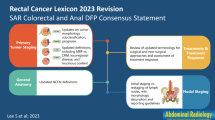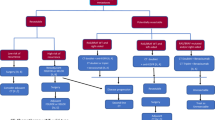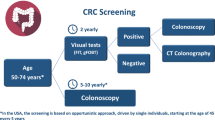Abstract
Background
Colorectal cancer (CRC) in the young is rare. Outcomes remain varied compared to older populations. The study reviews characteristics and overall survival (OS) of CRC in patients ≤50 years old.
Materials and methods
Five hundred and twenty-three (14%) of 3,796 sporadic CRCs were identified. Patients were compared for demographics, tumour characteristics, treatment, and 5-year overall specific survival. Independent prognostic factors were evaluated.
Results
The majority were males (54%) with a median age of 45 years (range 19–50 years). Sixty-three percent of the patients presented with advanced stage disease (stage III and IV), and tumours were predominantly left-sided (83%). A higher frequency of mucinous or signet ring cell histological subtypes (16% vs 9%, p = 0.028) as well as poorly differentiated tumours (30% vs 12%, p = 0.0001) were present in younger patients ≤40 years. With a median follow-up of 41 months, the 5-year OS is 58% (95% confidence interval 53–64%). Younger patients ≤40 years had significantly superior 5-year OS of 62% vs 58% in the age group 41–50 years old (p = 0.004). Multivariate analysis identified five independent prognostic features: age group of 41–50 years, poorly differentiated tumour grade, presence of perineural infiltration, high tumour stage, and carcinoembryonic antigen values ≥5 ng/ml.
Conclusion
This study has revealed significantly improved 5-year survival in young CRC compared to those reported in the literature.


Similar content being viewed by others
References
Atkin WS, Cuzick J, Northover JM et al (1993) Prevention of colorectal cancer by once-only sigmoidoscopy. Lancet 341:736–740
Chia KS, Lee HP, Seow A, Shanmugaratnam K (1996) Trends in cancer incidence in Singapore, 1968–1992. Singapore Cancer Registry Report No. 4 p 114
Parkin DM, Whelan S, Ferlay J, Raymond L, Young J (1997) Cancer incidence in five continents. IARC Scientific Publication No. 143. IARC, Lyon
Surveillance, Epidemiology, and End Results (SEER) Program (2002) Public-use data (1973–1999). http://www.seer.cancer.gov. Cancer Statistics Branch, Surveillance Research Program, DCCPS National Cancer Institute, Bethesda, MD. Accessed August 2008
Soliman AS, Bondy ML, Levin B et al (1997) Colorectal cancer in Egyptian patients under 40 years of age. Int J Cancer 71:26–30
Yilmazalar T, Zorluoglu A, Ozguc H et al (1995) Colorectal cancer in young adults. Tumori 81:230–233
Singh Y, Vaidya P, Hemandas AL et al (2002) Colorectal carcinoma in Nepalese young adults: presentation and outcome. Gan To Kagaku Ryoho 29(Suppl):223–229
Isbister WH (1992) Colorectal cancer below age 40 in the Kingdom of Saudi Arabia. Aust N Z J Surg 62:468–472
Taylor MC, Pounder D, Ali-Ridha NH, Bodurtha A, MacMulin EC (1988) Prognostic factors in colorectal carcinoma of young adults. Can J Surg 31:150–153
Palmer ML, Herrera L, Petrelli NJ (1991) Colorectal adenocarcinoma in patients less than 40 years of age. Dis Colon Rectum 34:343–346
Marble K, Banerjee S, Greenwald L (1992) Colorectal carcinoma in young patients. J Surg Oncol 51:179–182
Cusack JC, Giacco GG, Cleary K et al (1996) Survival factors in 186 patients younger than 40 years old with colorectal adenocarcinoma. J Am Coll Surg 183:105–112
Adloff M, Arnaud JP, Schloegel M, Thibaud D, Bergamaschi R (1986) Colorectal cancer in patients under 40 years of age. Dis Colon Rectum 29:322–325
Beckman EN, Gathright JB, Ray JE (1984) A potentially brighter prognosis for colon carcinoma in the third and fourth decades. Cancer 54:1478–1481
Lee PY, Fletcher WS, Sullivan ES, Vetto JT (1994) Colorectal cancer in young patients: characteristics and outcome. Am Surg 60:607–612
Heys SD, Sherif A, Bagley JS, Brittenden J, Smart C, Eremin O (1994) Prognostic factors and survival of patients aged less than 45 years with colorectal cancer. Br J Surg 81:685–688
O’Connell JB, Maggard MA, Liu JH, Etzioni DA, Livingston EH, Ko CY (2004) Do young colon cancer patients have worse outcomes? World J Surg 28:558–562
Galloway DJ, Burns HJ, Bear H, Jarrett F, Boyle P, Georges WD (1984) Colorectal carcinoma in young adults. Clin Oncol 10:205–211
Mitry E, Benhamiche AM, Jouve JL, Clinard F, Finn-Faivre C, Faivre J (2001) Colorectal adenocarcinoma in patients under 45 years of age: comparison with older patients in a well defined French population. Dis Colon Rectum 44(3):380–387
Vasen HF, Watson P, Mecklin JP, Lynch HT (1999) New clinical criteria for hereditary nonpolyposis colorectal cancer (HNPCC, Lynch syndrome) proposed by the International Collaborative group on HNPCC. Gastroenterology 116:1453–1456
Greene FL, Page DL, Fleming ID et al (eds) (2002) AJCC Cancer staging manual 6th Ed. Springer-Verlag, New York, NY
O’Connell JB, Maggard MA, Liu JH et al (2003) The rates of colon and rectal cancers are significantly increasing in young adults. Am J Surg 69:866–872
O’Connell JB, Maggard MA, Livingston EH, Yo CK (2004) Colorectal cancer in the young. Am J Surg 187:343–348
Chiang JM, Chen MC, Changchien CR, Chen JS, Tang R, Wang JY, Yeh CY, Fan CW, Tsai WS (2003) Favorable influence of age on tumour characteristics of sporadic colorectal adenocarcinoma. Patients 30 years of age or younger may be a distinct patient group. Dis Colon Rectum 46(7):904–910
Lin JT, Wang WS, Yen CC, Liu JH, Yang MH, Chao TC, Chen PM, Chiou TJ (2005) Outcome of colorectal carcinoma in patients under 40 years of age. J Gastroenterol Hepatol 20(6):900–905
Chung YF, Eu KW, Machin D, Ho JMS, Nyam DCN, Leong AFPK, Ho YH, Seow-Choen F (1998) Young age is not a poor prognostic marker in colorectal cancer. Br J Surg 95:1255–1259
Lynch HT, de la Chapelle A (2003) Hereditary Colorectal Cancer. N Engl J Med 348:919–932
Gryge R, Kim H, Hsieh ETK et al (2000) Tumour microsatellite instability and clinical outcome in young patients with colorectal cancer. N Engl J Med 69:342–347
American Cancer Society (2002) Cancer facts and figures 2002. American Cancer Society Surveillance Research, New York (02-250<-No 5008.02:20-6)
Marsoni S, International Multicenter Pooled Analysis of Colon Cancer Trials Investigators (2001) Efficacy of adjuvant fluorouracil and leucovorin in stage B2 and C colon cancer. International multicentre pooled analysis of B2 colon cancers trials (IMPACT B2) investigators. Semin Oncol 28:14–19
NIH Consensus Conference (1990) Adjuvant therapy for patients with colon and rectal cancer. JAMA 11:1444–1450
Locker GY, Hamilton S, Harris J, Jessup JM, Kemeny N et al (2006) ASCO 2006 update of recommendations for the use of tumor markers in gastrointestinal cancer. J Clin Oncol 24(33):5313–5327
Duffy MJ, van Dalen A, Haglund C, Hansson L, Holinski-Feder E et al (2007) Tumour makers in colorectal cancer: European group on tumour markers (EGTM) guidelines for clinical use. Eur J Cancer 43(9):1348–1360
Wiratkapun S, Kraemer M, Seow-Choen F, Ho YH, Eu KW (2001) High preoperative serum carcinoembryonic antigen predicts metastatic recurrence in potentially curative colonic cancer: results of a five-year study. Dis Colon Rectum 44(2):231–235
Acknowledgements
The authors would like to thank the following people in the preparation of the manuscript: Singapore polyposis registry coordinator, Ms. Carol TT Loi, RN Msc (Healthcare); senior biostatistician of the Department of Clinical Research Singapore General Hospital, Ms. Stephanie MC Fook-Chong, BSc MSc (McGill) CStat; and the rest of the contributory authors to the manuscript: Dr. Jit-Fong Lim, Dr. Kok-Sun Ho, Dr. Boon-Swee Ooi, and Dr. Choong-Leong Tang.
Author information
Authors and Affiliations
Corresponding author
Rights and permissions
About this article
Cite this article
Chew, MH., Koh, PK., Ng, KH. et al. Improved survival in an Asian cohort of young colorectal cancer patients: an analysis of 523 patients from a single institution. Int J Colorectal Dis 24, 1075–1083 (2009). https://doi.org/10.1007/s00384-009-0701-7
Accepted:
Published:
Issue Date:
DOI: https://doi.org/10.1007/s00384-009-0701-7




